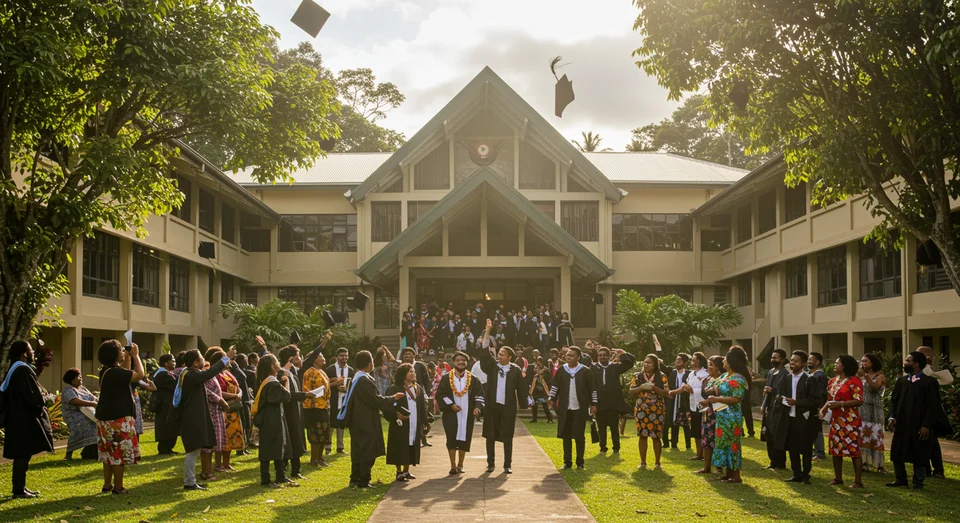Papua New Guinea University of Technology Celebrates First Female Geomatics Graduate, Matilda Naiawi
338 views
The Papua New Guinea University of Technology (PNGUoT) marked a milestone in its 57th Graduation ceremony, celebrating the inaugural class of Bachelor of Science in Geomatics graduates. Among the six trailblazers was Matilda Naiawi, who etched her name in history as the program's first female graduate. Her journey, a testament to resilience and ambition, began humbly in 2018 as a survey store person and culminated in this groundbreaking achievement, inspiring a call for greater female representation in the traditionally male-dominated sphere of surveying and land studies.

A Turning Point for Women in Geomatics
For Naiawi, the path to her degree was neither linear nor devoid of hurdles. Starting as a store person in the surveying field, her curiosity and determination propelled her to pursue a diploma in 2021, laying the foundation for her eventual enrollment in the bachelor's program. Navigating academic and personal challenges, she emerged as a symbol of perseverance and a beacon for women aspiring to break barriers in technical disciplines. Her achievement is not just a personal triumph but a societal statement, challenging entrenched norms and redefining possibilities for women in Papua New Guinea and beyond.
The Bachelor of Science in Geomatics program itself represents a significant leap forward in the nation's academic offerings. A multidisciplinary curriculum, it merges traditional surveying techniques with cutting-edge technologies such as GIS (Geographic Information Systems), remote sensing, photogrammetry, spatial statistics, and computer science. Graduates are equipped to step into roles as geospatial analysts, GIS technicians, and survey operations coordinators, among others, addressing the growing demand for expertise in spatial data and land management both locally and globally.
For Papua New Guinea, the introduction of this program and the success of its first graduates signal a commitment to advancing specialized education tailored to the nation's developmental needs. The country, rich in natural resources and complex terrains, stands to benefit immensely from professionals skilled in geomatics, whose work underpins urban planning, environmental conservation, disaster management, and sustainable development initiatives. With the program now firmly established, it opens doors not only for academic growth but also for fostering innovation in industries reliant on geospatial data.
Naiawi’s achievement holds particular significance in the broader conversation around gender equity in STEM fields. Surveying and land studies have long been perceived as male-dominated domains, with cultural and systemic barriers often discouraging women from entering the profession. By earning her degree and stepping into the spotlight, Naiawi has shattered stereotypes and laid a path for future generations. Her call for more women to join the field resonates as both an invitation and a challenge to dismantle the barriers that have historically excluded women from technical professions.
The ripple effects of her accomplishment are already visible. As the first female graduate of PNGUoT’s geomatics program, Naiawi has become a role model, her story offering a powerful narrative of determination and success against odds. Her presence in the field not only diversifies perspectives but also enriches the discourse on land studies and geospatial analysis, underscoring the importance of inclusive representation in shaping the future of these disciplines.
Looking ahead, the success of the inaugural geomatics class hints at a transformative era for PNGUoT and its role in shaping the nation's workforce. As the university continues to refine and expand its programs, it has the potential to emerge as a hub for innovation and excellence in technical education. For students like Naiawi, the journey does not end at graduation; it is the beginning of a professional trajectory that promises to influence and inspire.
Matilda Naiawi’s story is more than an individual achievement—it is a narrative of progress, possibility, and the power of education to rewrite societal norms. Her words urging more women to step into the field carry the weight of experience and the promise of change. In a world increasingly defined by data and technology, the inclusion of diverse voices in geomatics is not just desirable; it is essential. As Papua New Guinea celebrates this milestone, it also looks to the future, where stories like Naiawi's will no longer be exceptions but the norm.
